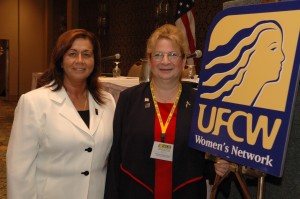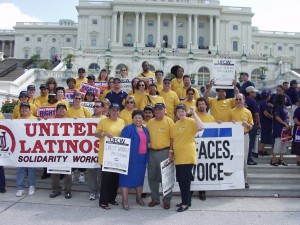- Equity and Inclusion Workshop
This is a session designed to begin a conversation around issues of equity and inclusion at our worksites and within our union.
Local unions utilizing this outline will find the training to be most effective if they commit, in advance, to continue these conversations and to develop action plans for ongoing work.
- At The River I Stand: Screening Information and Discussion Questions
Film screenings can be a great way to engage members and get conversations going. Info on how to order a copy of “At the River I Stand” is available here. Click here for discussion questions you can use to engage attendees on labor and the civil rights movement - Awesome Addie
The UFCW Minority Coalition Trailblazer Series is an educational resource that commemorates the work and life achievements of UFCW union leaders of color who helped build the American labor movement and led the way in the struggle for justice and equal rights.
Awesome Addie is the first in the UFCW Minority Trailblazer Series–an account of the life of the late UFCW International Vice President Addie L. Wyatt. Beginning with Addie’s life as child in the rural south, this publication follows her story as her life transitions to the harsher urban environment in Chicago, where she eventually got hired for a company called Armour for a typing position. - LGBT Resources
- Reaching Young Workers
- Language Access
The UFCW has a proud and storied history of opening the doors of equality and opportunity for all workers including immigrants, women, and people of color. Led by an activist, rank-and-file membership, the United Packinghouse Workers of America began writing equality for black workers into their contracts during the 1940s, at a time that few believed it was possible. African American butchers joined the ranks of the retail clerks when no other union would represent them. Together in their union, men and women united to force their employers to pay women the same wages as men in the 1950s—20 years before pay equity became part of the national debate.
From the time of Upton Sinclair’s The Jungle, we have always been a union of immigrant workers representing women and men regardless of national origin, language, or immigration status, because we know when we let employers exploit immigrant workers to reap more profits, all people suffer.
The UFCW has always been a union ahead of our time. We have always been a union that defends our members’ interests as workers, and defends their civil rights as well. The UFCW is on the front lines of crucial civil rights battles—from defending against voter suppression bills designed to keep African Americans away from the polls, to our work to stop the exploitation of refugees from Somalia, Sudan, and Burma. We fight against discrimination on the basis of sex or sexuality; we fight for contract language that doesn’t punish people for celebrating their faith. Our union is aligned with women and men, with people of all colors and creeds, all races, all languages, all orientations, and all people who are committed to the work of equality and economic justice. It’s the right thing to do. For the entire history of our union, our employers have tried to exploit our differences, to keep us divided, to keep us from realizing that workers who look different, who worship differently, or who speak different languages have more in common than we think.
Our challenge is to be more than simply aligned with diverse constituencies. We cannot bring equality and economic justice to communities we don’t truly belong to. We cannot approach organizing from the perspective of outsiders looking in.
Harnessing the strength of our diversity, with a focus on increasing inclusion at every level of our union, must be a fundamental part of our growth strategy or we will not grow our ranks or bring people into our movement.
We gain tremendous strength, credibility, and authority from our diversity. It is what allows us to more effectively push our employers to bargain fair contracts, pressure elected leaders to hear the voices of working families, and convince our neighbors to join our broad movement for justice.
- Overall, in the U.S. and Canada, women make up 51% of UFCW membership.
- In the U.S., 44% of UFCW membership is made up of people of color, including 17% African American, 21% Latino, and 4% Asian.
- About 16% of the Canadian population is made up of people of color.
- 77% of Region 4 membership is made up of women.
Strategies for Increasing Equity
Language access
- Audit the languages spoken at your workplaces and translate key documents such as collective bargaining agreements, meeting notices, newsletters, and handbills.
- Provide two-way language translation during meetings and other union events, including sign language interpreters, if necessary.
- Pressure employers to offer English language training courses at the workplace and to provide translation of worksite policies and safety and educational information.
Harassment & Discrimination
- Enforce each workplace’s harassment and discrimination policies, and negotiate to make them stronger.
- Ensure that members who’ve experienced harassment and/or discrimination are confident that they can approach any elected local union official. Ensure that staff receives appropriate training and that the membership is aware that they have been trained.
- Make sure the membership and staff know that harassment and discrimination are union issues by discussing harassment and discrimination at union meetings, offering workshops, films, and other events focused on challenging oppression, at general meetings and/or union trainings. Train members and stewards on how to report workplace harassment. Encourage staff and activists to attend women’s conferences and/or conferences on sexism, heterosexism, and racism.
In the Community
- Attend community coalition meetings focused on challenging racism, reductions in social services, immigrant rights, and other forms of oppression.
- Encourage your labor council to establish an equity committee, and to include community representatives. Support the committee’s efforts to organize educational activities.
- Support efforts to organize workplaces with large groups of immigrant workers, people of color, women and young people.
In your contracts
- Negotiate family leave, health care coverage, bereavement policies, and other benefits that treat men, women, single parents, unmarried domestic partners, and LGBT people and their families equally.
- Fight for employer paid, union controlled anti-harassment training.
- Negotiate clauses that actively promote equality of access to training and skill development and paid educational leave.
- Ensure that workers have the right to refuse unsafe work in the cases of being personally, sexually or racially harassed, until the employer has taken steps to stop the harassment.
Constituency Groups
The UFCW’s constituency groups are made up of dynamic local union leaders and members who work to push each other to be more involved in their union, to mentor young UFCW activists from these communities, and to be dogged, constructive advocates for representation at both the local and International levels of the union.
UFCW Women’s Network
 The Women’s Network connects the UFCW’s activist women members with each other across the U.S. and Canada. Together they work to mentor, motivate, and educate UFCW women at the local union level in order to increase women’s participation in UFCW programs and activities, and build a group of women activists committed to growing the UFCW.
The Women’s Network connects the UFCW’s activist women members with each other across the U.S. and Canada. Together they work to mentor, motivate, and educate UFCW women at the local union level in order to increase women’s participation in UFCW programs and activities, and build a group of women activists committed to growing the UFCW.
Find more info about the Women’s Network on their Facebook page.
United Latinos
 The United Latinos work to empower Latino men and women within the UFCW at the local union level, at the International, and within our communities all over the U.S. The group is a staunch advocate on issues most important to the Latino community, including immigration and encouraging Latino voter turnout for worker-friendly candidates in local, state, and national elections.
The United Latinos work to empower Latino men and women within the UFCW at the local union level, at the International, and within our communities all over the U.S. The group is a staunch advocate on issues most important to the Latino community, including immigration and encouraging Latino voter turnout for worker-friendly candidates in local, state, and national elections.
Check them out on their website and Facebook page.
UFCW OUTreach
UFCW OUTreach is a constituency group dedicated to building mutual support between our union’s International, regions, and locals and the Lesbian, Gay, Bisexual and Transgender (LGBT) community and their allies in order to come together to organize for social and economic justice for all, regardless of age, race, gender, creed, color, sexual orientation, or gender identity.
Learn more about OUTreach on their website and Facebook page.
UFCW Minority Coalition
The mission of the UFCW Minority Coalition is to develop a unified voice and promote diversity and inclusion within the labor movement and with in the UFCW. The African American leaders and organizers who belong to the coalition are committed to growing the ranks of the UFCW while at the same time holding the union accountable for its commitment to diversity and inclusion as a fundamental key to growth. The group’s activists are on the front lines of current civil rights battles, like voter suppression efforts that threaten to disenfranchise thousands of voters at polls.
See more about the Minority Coalition on their website.
AFL-CIO
The AFL-CIO’s constituency groups—the A. Philip Randolph Institute, AFL-CIO Union Veterans Council, Asian Pacific American Labor Alliance, Coalition of Black Trade Unionists, Coalition of Labor Union Women, Labor Council for Latin American Advancement and Pride At Work—are unions’ bridge to diverse communities, creating and strengthening partnerships to enhance the standard of living for all workers and their families.
The groups also promote the full participation of women and minorities in the union movement and ensure unions hear and respond to the concerns of the communities they represent.
AFL-CIO constituency groups can be contacted at:
- A. Philip Randolph Institute
- AFL-CIO Union Veterans Council
- Asian Pacific American Labor Alliance
- Coalition of Black Trade Unionists
- Coalition of Labor Union Women
- Labor Council for Latin American Advancement
- Pride At Work

